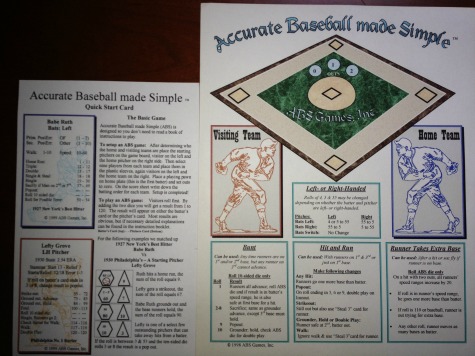The flow of baseball that is being disrupted by instant replay and lawsuits has destroyed the flow that lent itself to Ronald Reagan making up foul balls to a radio audience and fans playing board games that pitted the 1927 New York Yankees against the 1975 Cincinnati Reds and many of the other 34 all-time great teams listed below.
“There were several other stations broadcasting that game and I knew I’d lose my audience if I told them we’d lost our telegraph connections so I took a chance. I had (Billy) Jurges hit another foul. Then I had him foul one that only missed being a home run by a foot. I had him foul one back in the stands and took up some time describing the two lads that got in a fight over the ball. I kept on having him foul balls until I was setting a record for a ballplayer hitting successive foul balls and I was getting more than a little scared. Just then my operator started typing. When he passed me the paper I started to giggle – it said: ‘Jurges popped out on the first ball pitched.'”
In years before video games, millions of fans were drawn to radio telecasts as well as to board games such as Strat-o-matic, APBA, Statis-Pro and a new one I launched in 1999 called Accurate Baseball made Simple (ABS) that gave me a taste of the new fight by teams and players to reap revenue on any usage of the names of teams and players.
In 1998, after investing more than 600 hours and a purchase for an English firm to create, develop and produce thousands of dice with either 10-sides or 12-sides including a baseball, I was able to create a game that featured 36 teams – the best one for each city and nickname. So the only New York Yankees team in the game was the 1927 Yankees, while the Braves were nice enough to win exactly one title in three different cities to give me a Boston Braves, Milwaukee Braves and Atlanta Braves. The only team with a losing record in the game was the Kansas City A’s – whose best squad went 73-81 in 1958 in Kansas City between their days in Philadelphia and Oakland.
I was thrilled when the 36 teams broke up perfectly into four divisions – one for teams from before 1950, and then another for teams in the East, Central and West:
Central Division
As we prepared to launch, a lawyer informed us of one last hurdle – both Major League Baseball and the Players’ Association were getting very aggressive about having team names and players’ names on cards for board games. I dutifully sent off samples to both, and when I called to follow-up I had one nice comment from the Major League Baseball office.
“Yeah, I remember that game, it had the really neat big brown and green dice that looked like a baseball infield didn’t it?”
Encouraged, I assumed it would not be long before the fruits of my labors had people all over American past-time realizing i had developed the first game ever that perfectly balanced players from different eras (Honus Wagner could come to modern parks to hit live pitching, while Greg Maddux could go back to the dead ball era). My naivete was quickly replaced when I never heard back and instead watched all of the other board games start to leave the shelves. Even the mighty Sports Illustrated could not navigate the new world of lawsuits and gave up on Statis-Pro, which is still secretly printed in various locations each year for die-hard fans.
Here are the 36 teams who went into various eras to play each other. The Yankees of 1927 finally did emerge as the all-time champion, but with a surprising challenge within their “Oldies” division from the 1948 Cleveland Indians.

COMMENTS
Please let us know if you're having issues with commenting.